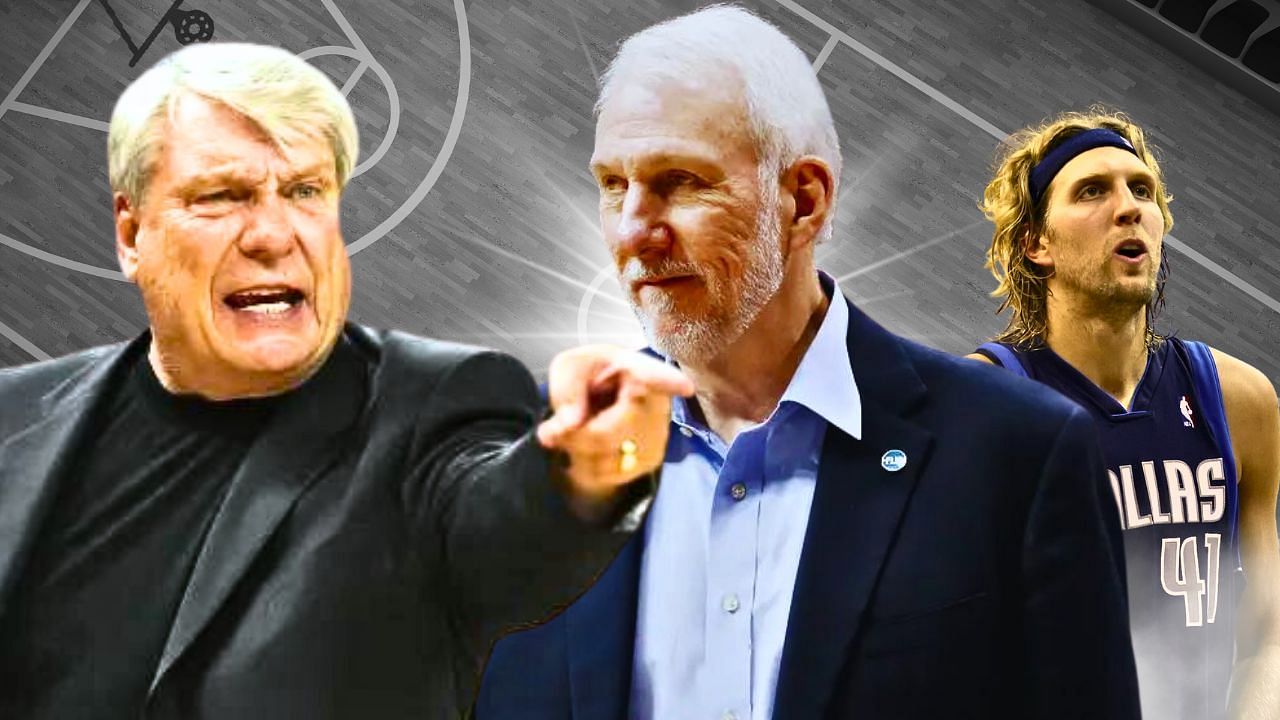
Exclusive: Don Nelson gives heartfelt praise to Dirk Nowitzki, Gregg Popovich ahead of 2023 Basketball Hall of Fame induction
Ideally, Don Nelson would toast Gregg Popovich and Dirk Nowitzki in person.
On August 12, the longtime San Antonio Spurs coach (Popovich) and the former Dallas Mavericks star (Nowitzki) will be part of what Nelson called “one of the greatest inductions in the history of the Hall-of-Fame.” Popovich led the Spurs to five NBA titles and eventually eclipsed Nelson with the NBA’s all-time regular-season coaching record. Nowitzki led the Mavericks to an NBA title (2011) while climbing to sixth place on the league’s all-time scoring list.
Beyond rattling off those resumes, Nelson could share other stories about Popovich and Nowitzki. Nelson could reflect on granting Popovich a spot on his coaching staff in Golden State (1992-94) before springboarding to San Antonio. Nelson could dish on scouting Nowitzki before the former Mavericks’ general manager/head coach secured him in a draft-day trade ahead of the 1998 NBA Draft.
Instead, the 83-year-old Nelson plans to watch the ceremony at his home in Maui, Hawaii.
“I’m sad I can’t be there. I don’t travel anymore,” Nelson told Sportskeeda. “I really want to be there if I could. Pop wanted me to put him in, and so did Dirk. But I just can’t.”
Nelson sounded more than thrilled, however, to speak about Popovich and Nowitzki. In a wide-ranging interview with Sportskeeda, Nelson talked about giving Popovich a job opportunity without ever formally meeting him, Popovich initially offering him the Spurs’ head-coaching job, and why he was thrilled that Popovich broke his all-time regular-season coaching record. Nelson also reflected on Nowitzki about the Mavs’ efforts to secure Nowitzki in the 1998 NBA Draft, the Germany native’s initial struggles in the NBA, and why he felt strongly about sitting him with a knee injury during part of the 2003 Western Conference Finals.
Editor’s note: The following Q&A has been edited and condensed.
What has Pop meant to you over the years?
“He’s the finest basketball coach I’ve ever been around. He has proven that by getting into the Hall-of-Fame, the all-time winning coach, and all the championships. He has all of the different things you need to be a good head coach. He has had all of those advantages throughout his career.”
Beyond his resume, what qualities does Pop have that make him the best coach?
“He has the gift of communication. He’s a great communicator with players. He really cares about each guy. His philosophy is different from any other coach that I’ve ever been around. After a game on the road, win or lose, he’d always have an open dinner for everybody. I’ve been to a few of those with him while he was the head coach in San Antonio. Basketball was never brought up. We talked about other things with life, what the players were feeling, and their families. It was a different relationship than any other coach that I’ve ever been around. It was a different philosophy that he had and carried out throughout his whole career.”
What were the highlights of your dinners?
“One was in San Francisco one night when they played us. I don’t remember who won or lost. But I went to dinner with his team afterward. I witnessed that kind of thing, which I had never done. But it’s a great idea. Most of his players, at least half, joined the dinner that night. It was remarkable.”
How did you wind up hiring Pop on your staff considering you didn’t initially know him?
“We had played San Antonio in the playoffs [in 1991] when Larry Brown was the head coach. We were able to beat them in six games. But I didn’t know him well at all. I had the habit of going to the arenas early on the day of the game sitting in the stands and watching our opposition and watching guys shoot in case there was anything I could take advantage of that night. I just noticed that a guy named Popovich was an assistant coach and was working with players individually.
I was impressed with how hard he worked and the things he worked on and the relationships he had with the players. It was all outstanding. So I made a mental note that that guy was a really good coach. After we beat them, Larry got fired. Along with Larry, Pop got fired. So Pop was looking for a job. I hadn’t even met him at that point. I just called him up and asked him that I’d like to have an interview with him. He was shocked because we had never met. I brought him in and loved him. So I offered him the job, and he took it. We just had some of the best two years together. We formed a friendship and relationship that is second to none. Now, he is one of my very best friends in life.”
You’ve said he’s been the best assistant coach you’ve ever had….
[Interrupt]. “No question. He’s the best I’ve ever had. He just had an advantage over anybody he competed against because of his philosophy.”
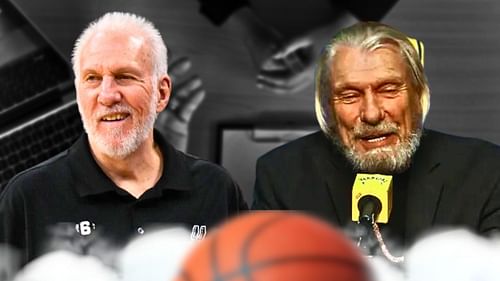
What did Pop do to help you out at Golden State?
“Well, that was one of my toughest times. I had a rookie that year by the name of Chris Webber and was very difficult. Together, we tried to do the best we could to make that work the way we wanted it to. Of course, it didn’t. But it was a really hard year for both of us. Pop did his best to help that situation. My problem was I had a really good team. But Tim Hardaway got hurt and missed the entire year after tearing up his knee. Chris Mullin had some issues and was apart from the team for a while. All my veterans, all of a sudden, were diminished. That gave Chris a chance to do the things he wanted to do, which was negative leadership and destroyed the whole year that we had. Pop and I went through that tough time together, so that probably brought us closer together.”
How so?
“Well, the two of us were together probably more than he and his wife. We spent tons of time together, most of the day, and a lot of times at night we’d have dinner. We had a bond that was second to none.”
I read you helped him negotiate his contract when the Spurs offered him the general manager job. What do you remember about that episode?
(laughs). “San Antonio wanted to hire him as a general manager. So I encouraged him to go down and check it out. He came back and said, ‘They offered me the job!” I asked him, “What did they offer you?” He told me the numbers. I said, ‘Pop, that’s very nice. But go back and ask them if they would increase your pay by $50,000 in year one because that’s going to add $50,000 a year to a five-year contract. That’s enough for you to buy a house!’ He said, 'Oh, I don’t know if I could do that, Coach.’ I told him, ‘Just do it.’ So he went back and said, ‘I would love to come, but would you mind adding $50,000 at the beginning and extending it through the contract?’ They just said, “Okay.’ (laughs). That was enough for him to buy his first house and he went on from there.”
Did you get a commission for helping with the negotiations?
(Laughs). “No, I never got anything. But he’s bought a nice bottle of wine for me plenty of times.”
Is it true that Pop then tried to hire you to coach the Spurs, but then Golden State wouldn’t let you out of your contract?
“I didn’t know the press had all that kind of stuff (laughs). Yeah, that was another situation. Pop didn’t like the head coach there, and he knew I was having all sorts of problems with Chris Webber. I told my ownership that it would be better if I just left and let Chris stay and get a new coach because I didn’t see how it was going to work with the two of us. I had a meeting with ownership with Jim Fitzgerald and some of the other owners of the team. They refused to let me go. So, I lost that [Spurs] job. Boy, I look back at that. Wow. If I had made that move? The owner was one of my best friends, too. I stood the course and then I lost an opportunity. Wow. With Pop [as the GM] and me as the coach, I could’ve imagined what a career I would’ve had. It would’ve been just like Pop.”
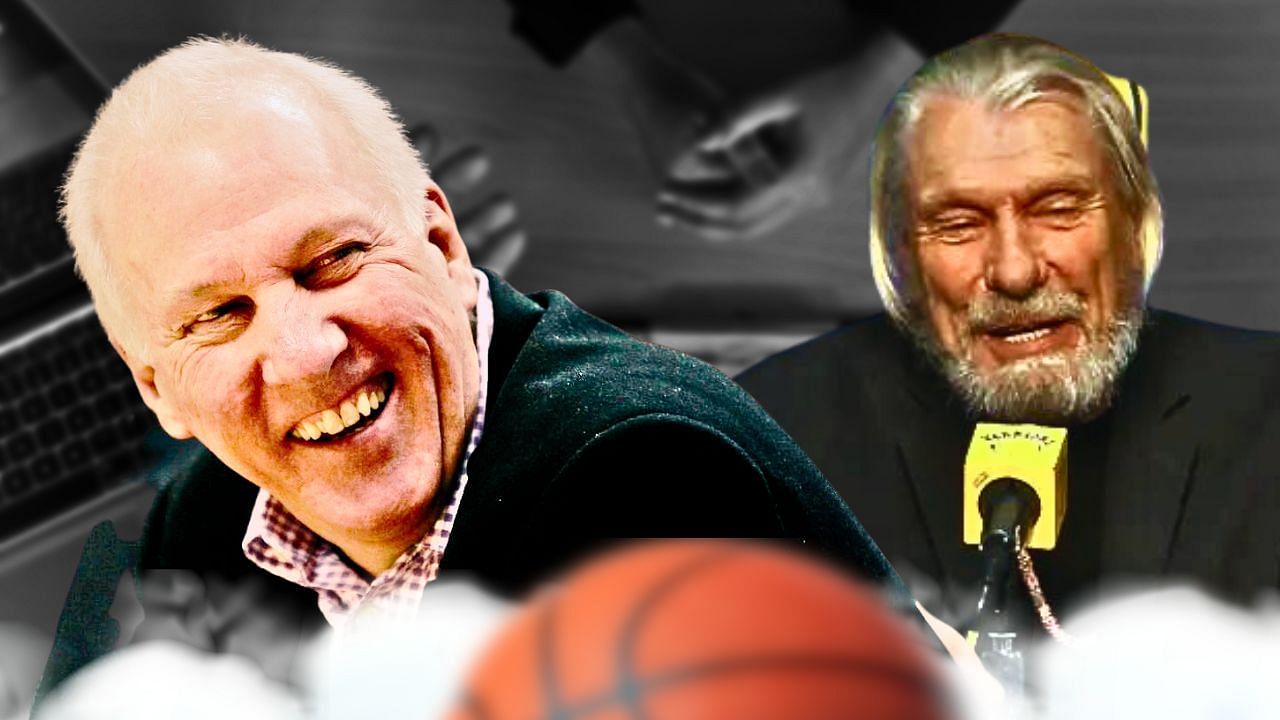
How would have history played out if you had gotten the job?
“I think it would’ve been the same. We coached similarly. Our philosophy was pretty much the same. So, it would’ve worked out greatly.”
How do you imagine what it would’ve been like to coach David Robinson, Tim Duncan, Tony Parker, and Manu Ginobili?
“Yeah, that’s not bad, right? (laughs). As I look back at that, there were two turning points in my career. That was a big one. The other one was when I coached Milwaukee. We beat the Celtics in the [1982] playoffs and knocked them out with Larry Bird and all of the big guys. After the game, Red [Auerbach] walked by the locker room and got my attention. We huddled in a corner. He asked me about coaching the Celtics. I said, ‘Red, I’d love to come back. But they’ve been so nice to me in Milwaukee. I just can’t leave you.’ He said, ‘Okay, I understand.’ Then they hired KC Jones. Those are two good opportunities that I had, but that I didn’t do. That had a pretty big influence on my career.”
I read you played a prank on Pop when he was on your staff regarding a painting. What’s the story behind that?
“He loved his college coach [at Air Force]. I called the coach up one day after Pop was telling me that he was quite an artist. So I talked to him and told him, ‘With Pop’s birthday coming up, I’d love to get one of your pieces of art and I’ll give it to Pop as a gift. I’ll pay whatever you want for it.’ He said, ‘No, I’d never charge you anything. I’ll just send you something.’ He sent me a beautiful picture of a Native American. I got the picture and put a beautiful frame on it. Then, I went to an art gallery and told the dealer, “Let’s put this in your store; I’m going to pull a prank on Pop. I want to take him in there and have him find the painting. I want you to put a big number on it.’ He put a $25,000 tag on it. So we go to the art store and are just looking around. We try to get Pop to go down this one aisle where the painting is. He’s looking around and he sees it. He says, “I think this is from Coach!’ He looks at the name and sees the autograph at the bottom. He says, “That’s my Coach! That’s him!’ So I said, ‘Is that really, Pop? I’d like to buy it for you.’ We take it up to the cashier and he says, ‘It’s $25,000.’ I said, ‘Wrap it up and give it to Pop.’
Pop couldn’t believe that I’m buying him a $25,000 painting from his coach. I had all the other assistants with me. So we get the picture wrapped up and we’re walking out. He starts crying (laughs). He’s literally bawling like a baby. So we decided we were going to tell him about the prank at dinner and that we played a joke on him. We get to dinner and we tell him everything that happened. We had so many laughs over that. We still laugh about it today. Pop kept saying, “God damn it Nellie; you got me!’”
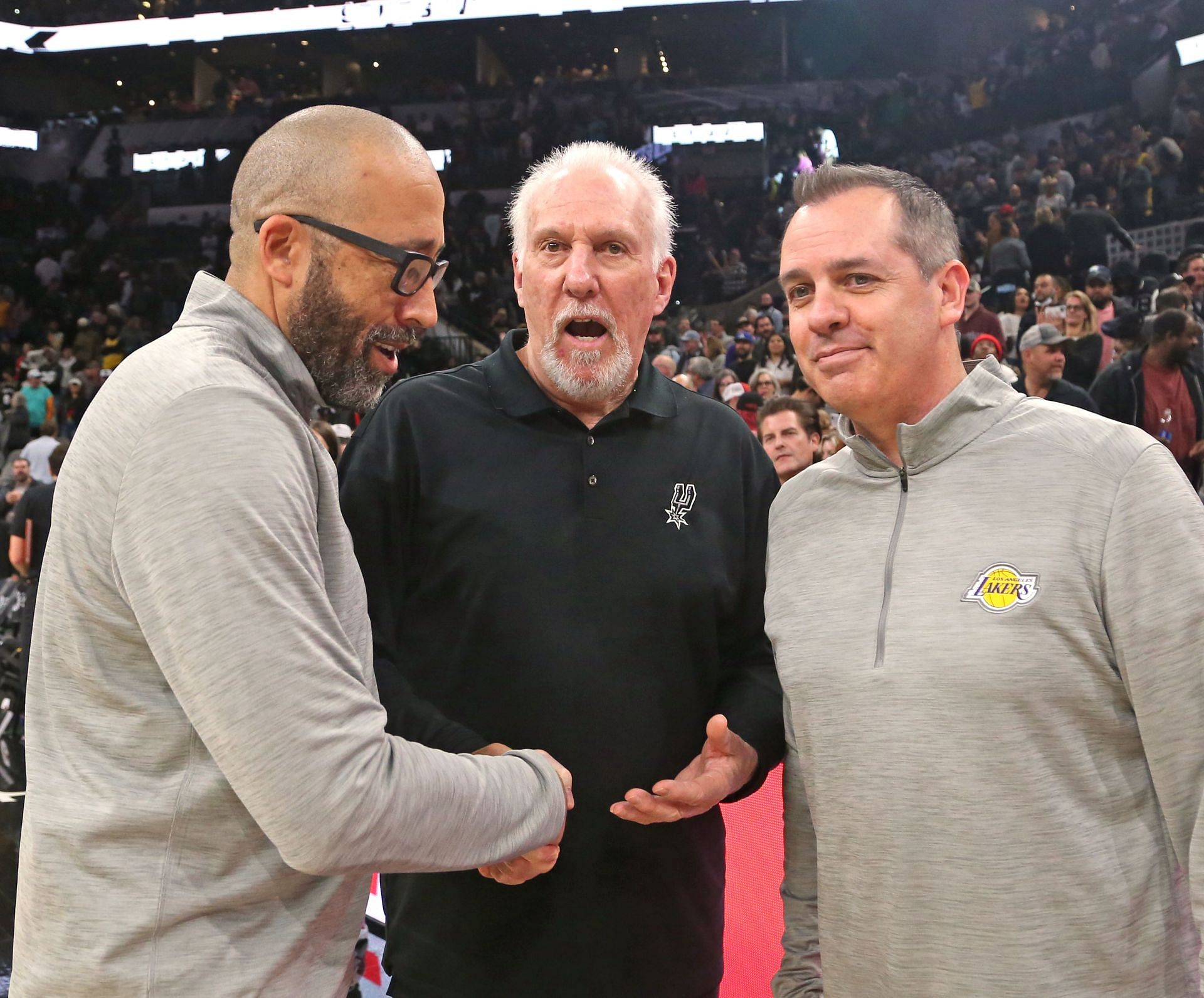
You were very supportive of Pop when he broke your all-time winning record. What feelings did you have about what that record meant to you before Pop broke it?
“It’s longevity more than being good or bad sometimes. I was able to coach for a long time. It didn’t mean as much to me to have that record as you might think. I felt bad when I passed Red Auerbach and when I passed Lenny [Wilkens]. I always felt Lenny was a way better coach than I was. I didn’t feel I was deserving of it to start with, so to have Pop take me out was a real positive for me. I was really happy. I’m very happy to be at No. 2, 10 or 15. I don’t care.”
I remember you told me a few years ago that you didn’t think Pop even cared about that record….
[Interrupts] “I don’t think he does that much. It’s longevity and ability to be a long-time coach. I called him up one time and asked him, “Are you trying to get the record for losses as well?’” (laughs).
What was your reaction to Pop getting another five-year extension with the Spurs shortly after they drafted Victor Wembanyama?
“He called me a couple of days ago. He said, ‘I owe you!’ I said, ‘Well, you got $80 million. What are you going to give me? Another bottle of wine?’” (laughs).
What has Pop’s gratitude to you meant to you?
“That’s just friendship. That’s the way he is. He always gives credit to somebody else for the things that he has done. He is a great coach and always was. He had a chance to prove it, and he did. There is nobody more deserving of having that record, all of the success that he’s had, and the biggest contract in coaching history. All of those things are well deserved. He did it himself. Nobody helped him do that. That’s his ability. He deserves every bit of this.”
What do you remember about discovering Dirk?
“We went to visit Dirk before the draft. We went to Germany and spent three or four days with him and his family in Wurzburg. I got to meet his family and Dirk and understand his situation and what he was about to go through at age 18. I was trying to get to know everybody. His dad said something to me that I never forgot. He says, ‘If you guys draft Dirk, you’re going to be his American father.’ I can’t go. That’s really the way I tried to treat him. I tried to treat him as a son.
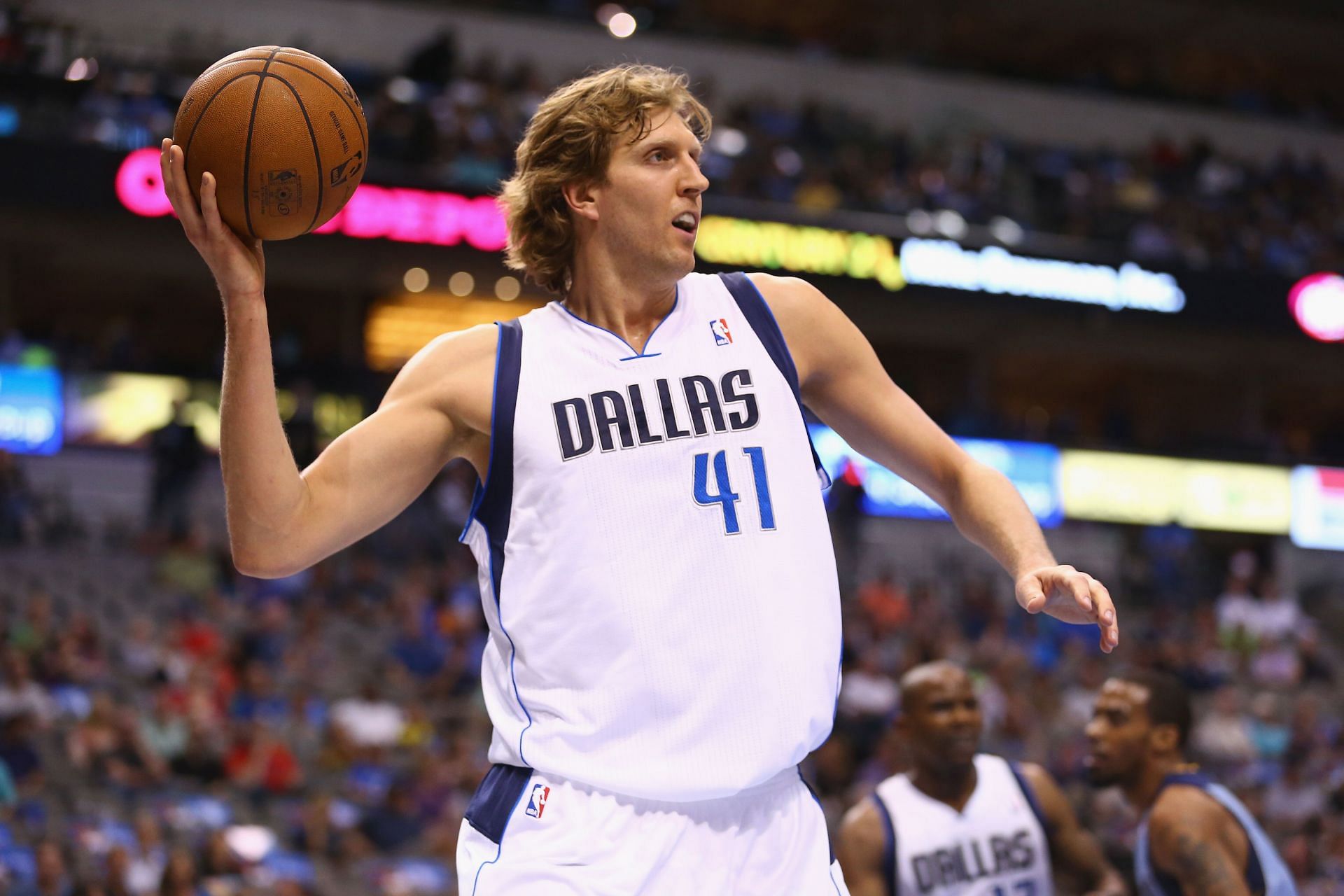
During his first year, he went through some tough times. He got homesick and wanted to go home one time. We had to walk him through that and get him to stay. It’s like with a lot of kids when they go to camp for the first time and are away from home. They get a little homesick. I’ve had a lot of experience with young kids at camp that want to go home. The kids may cry for a day or so. You just have to work them through that. Dirk stayed the course and became one of the great players of all time. I couldn’t be any more proud of him.”
How did you try to be that ‘American father’ for him?
“Steve Nash was his best friend. Steve really helped with that. They would hang out and were both single at the time. Steve should get more credit than me. He was there for him and told him he would get through his first year. The team was going through some hard times, too. As Dirk matured, the team was maturing around him. We had some times that we lost a bunch of games that we shouldn’t have. But we all got together as a team and supported him. Steve spent more time with him, and then it worked out. After that first year under his belt, he was fine.”
You have said numerous times that when you first saw Dirk play that “you had never seen a young player with more skill.’ What did he show you at the Hoop Summit?
“Donnie [Nelson] told me how good he was. I witnessed it when I visited him and his family. We went to the gym a few times. I could see the talent there. Where I really got to watch him scrimmage against really good players was when he came to San Antonio to play a game that featured high school Europeans against the Americans. Donnie got in touch with that team. They were looking for a place to work out because they wanted to come a week early. Donnie got him to work out at the YMCA in Dallas, Texas. As they were working out, I went to the stands as high as I could. I watched the practices. We were just amazed at the skill the guy had. Dirk was seven feet tall, but he played like a small forward. He was just dominant. I never saw a guy with that talent at 18 years old.
I was convinced that was the guy we were going to try to get. I liked Dirk and Paul Pierce as the best players in the draft that year. I would’ve taken either guy. The funny thing is I worked my way up and got ahead of Boston because we had heard that Boston wanted to take him. We also told his camp that we didn’t want anybody to interview him. We wanted to make sure we were the only ones that knew about him. We even tried to convince him not to even play in that San Antonio game. He had played and had played great. Now all of a sudden, the NBA had gotten word that the guy was a great player. Of course, they wanted to work him out personally. Donnie hid him in his basement at his house for a week. Nobody could find out where Dirk was (laughs). Boston wanted to interview him, but they didn’t know where he was. That kind of helped us.
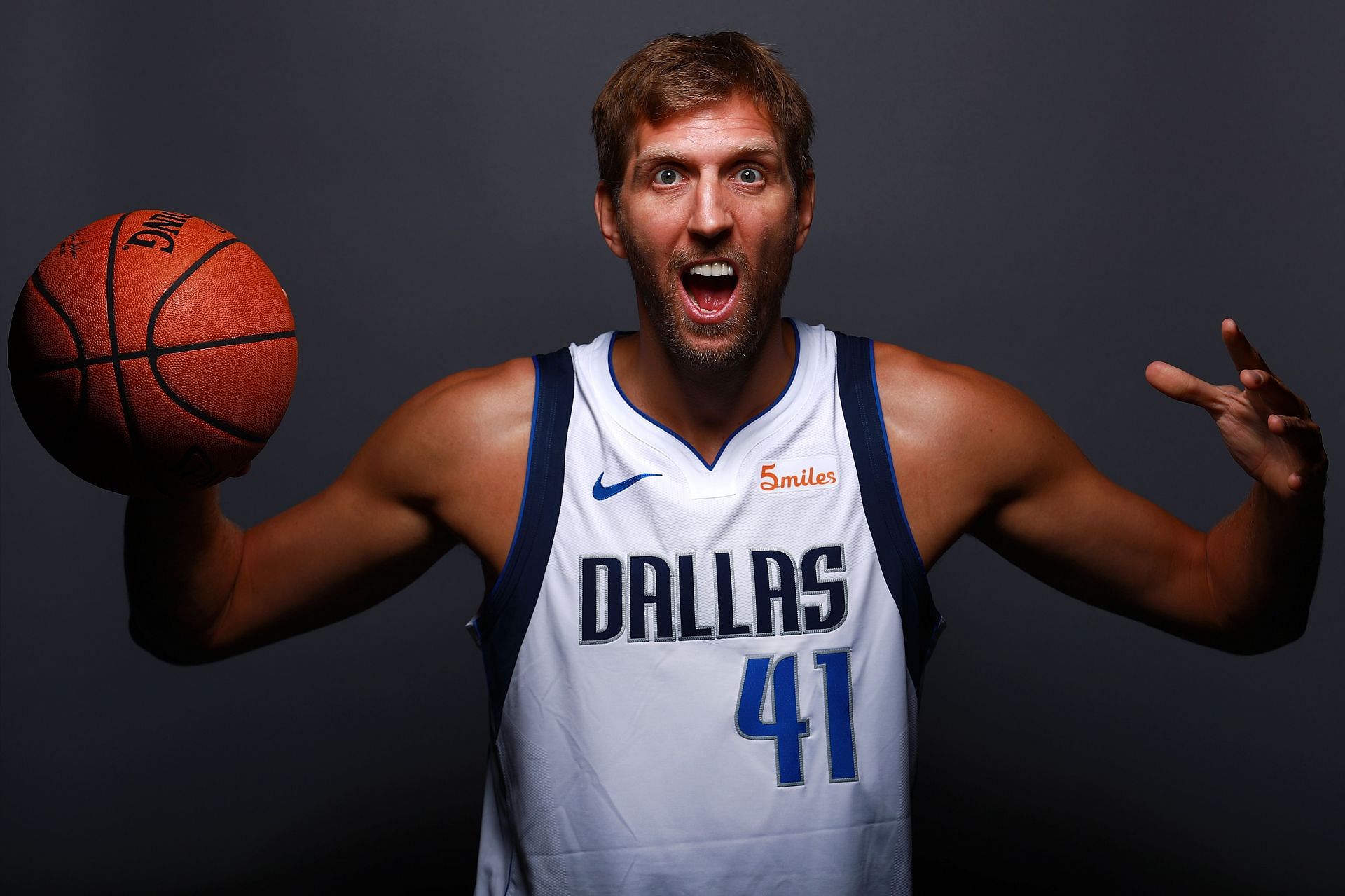
We were afraid if we didn’t get ahead of Boston that they were probably going to take him. We get to the draft and both he and Pierce are still available. Dirk was my favorite guy in the draft. But there they both were. I’m trying to make my decision. We’re on the clock, and they’re both available. I’m saying to Donnie, “Pierce is a terrific player.’ Donnie said, ‘Come on Dad; we’ve already been through all of this! Let’s make the choice. We know we’re taking Dirk!’ I said, “My God, you’re right.’ So we took Dirk ahead of Pierce. But Boston got a hell of a player, too. It’s funny the way things work out. The Milwaukee Bucks wanted “Tractor” Traylor. We had no interest in “Tractor” Traylor. So we swapped picks so they could get “Tractor” Traylor and then we thought Dirk would be available because we were ahead of Boston. We traded picks and I think they gave me a million dollars, too. We got our guy and it worked out perfectly.”
After Dirk got through the initial growing pains, what were the turning points you saw that projected how special of a player he would be?
“The only problem I had is he didn’t really have a good low-post game. He was 7 feet tall. As long as he played against other big guys, he would be open quite a lot. When they started matching up smalls against him and playing into him, then, of course, we put him in the low post. But he didn’t really have a low-post game. I wanted him to punish small players down there. I wanted him to be dominant, get to the basket, and get fouled. He just had the turnaround jump shot. I’m trying to get him to have a low-post game. My son, Donnie, said, ‘Dad, what are you doing all of that for? He makes every shot.’ I said, ‘Yeah, but he should be dominating and getting fouled more.’ He said, ‘Dad, he scores every time against these guys with his turnaround jump shot. Why don’t you just let him do that?’ I said, 'My God, you are right.' When we did post him up, Dirk would score on them with a jump shot.”
When Dirk had his knee injury in Game 3 of the 2003 Western Conference Finals against San Antonio, you expressed concern about the risk with playing him. How did you weigh that decision?
“That is the thing that wound up getting me fired years later. Mark Cuban wanted him to play. I watched Dirk work out and the guy couldn’t run. He had a dislocated kneecap. I just thought it might have a bearing on his future. I thought we shouldn’t take that risk. I sat him out for a couple of games and planned on playing him if we got to a seventh game. I thought maybe he would be ready to play by then. But until then, I stubbornly refused to play him. I didn’t want to take that risk with a guy’s career. He is so young. If we screw that knee up, he’s going to be playing with a brace for the rest of his career. It didn’t make any sense to me. So, I didn’t play him.
I had the wrath from Cuban on that one for the rest of my career. We disagreed. The doctors thought he could play, but I watched him more than anybody. He just couldn’t do anything other than stand and shoot jump shots. That wasn’t going to work in the playoffs against San Antonio. They were going to make him move. I never asked Dirk how he felt about that. That would be a good question for Dirk. He wanted to play. But I said, ‘I’m not going to play him.’”
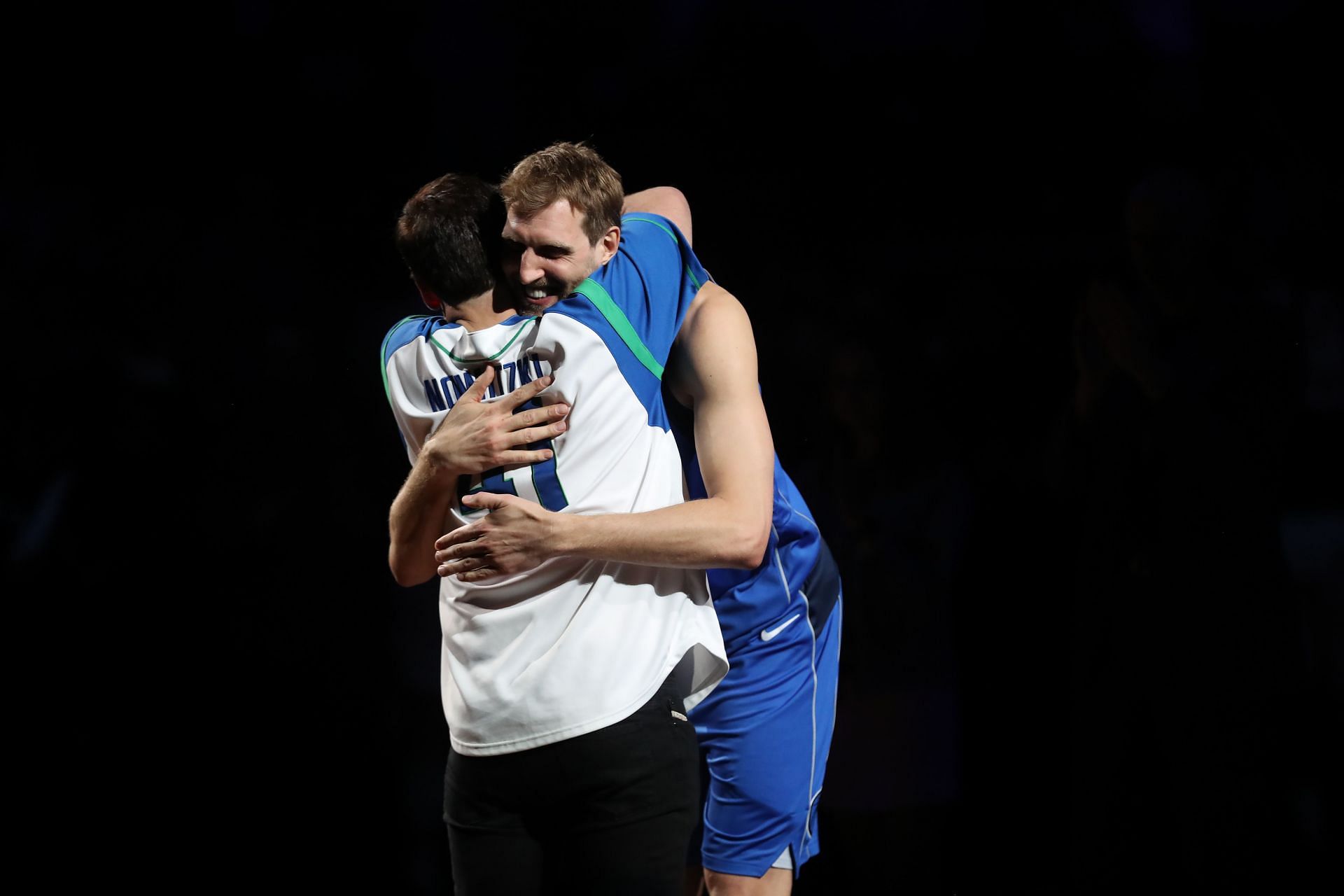
Marc Stein reported he has asked Dirk about it multiple times, and he has conceded he doesn’t think he could have played.
“There was no question in my mind that it was the right decision. But it ended up causing a rift between Mark and me, and eventually caused me to get fired probably for that reason.”
Interestingly, you then coached the “We Believe” Warriors team against Dirk and the Mavs and upset them in the first round of the 2007 playoffs. Stephen Jackson and Matt Barnes have credited your game plan on defending Dirk that series. What was the game plan?
“By coaching him, I knew his strengths and weaknesses, that’s for sure. We had a game plan for him. It worked pretty well. We made it hard on him. We gave him a tough series. We were jacked up just to be in the first. Then to beat the No. 1 team was pretty special. It was exciting for our locker room. In the first game, we’re right in the game. But I had some guys that were emotionally challenged. Jack got thrown out of the game. Baron Davis got thrown out of the game. But we only lost by four points. I told the team afterward that we can beat these guys. In the next game in Dallas, we beat them. Then we eventually beat them in six. ‘We Believe’ solidified the franchise. It was something they were looking for for years – some excitement. We were able to do that. It was unbelievable.”
Why didn’t you get to go to Dirk’s jersey retirement?
“I didn’t go. I didn’t know they were having one. I never got an invitation. I would’ve been to that one. I wish I would’ve been there.”
Follow NBA writer Mark Medina on Twitter, Instagram, Facebook, and Threads